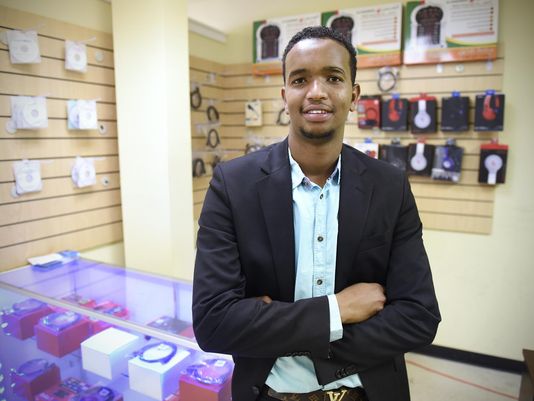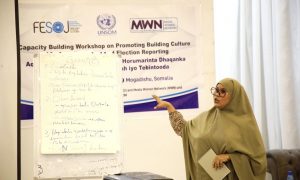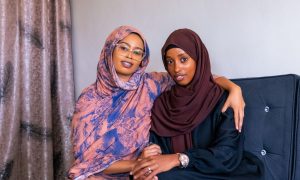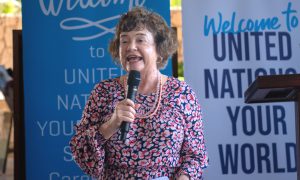
SCTimes | IBRAHIM HIRSI | August 17, 2015 |
 When Mohamed Jama Mohamud dashed through a busy parking lot on a recent afternoon at a small African business hub in north St. Cloud, some shoppers stopped him to ask, “When can you install my box?”
When Mohamed Jama Mohamud dashed through a busy parking lot on a recent afternoon at a small African business hub in north St. Cloud, some shoppers stopped him to ask, “When can you install my box?”
Towering over each person he interacted with, Mohamud gave a soft smile and carefully chose his words as he explained his busy schedule.
Then Mohamud, a bilingual communication support specialist at North Junior High, promised that he would call them over the weekend to install ethnic channels that connect the immigrant communities to their native countries.
For nearly a year and a half now, Mohamud has been involved in providing international television service, which installs foreign-language channels for the swelling St. Cloud immigrant population, many of them from Sudan, Ethiopia and Somalia.
Mohamud explained how the process works: “I install the channels on Roku or Android TV streaming boxes, but mostly Roku. When installations are done, I take the boxes to whoever needs the service. And then, I connect it on their TV.”
With customers in St. Cloud, Fargo and Willmar, Mohamud said he charges people about $250 per box, which has as many as 500 channels that carry entertainment programs, movies, sports and news.
“People don’t have to pay a fee every month or every year,” he said. “They just buy the box one time.”
Generally, immigrants maintain strong family ties with their homeland and are eager to learn about the day-to-day politics that affect their loved ones back home. Mohamud’s service allows access to news that no local media provides.
These channels are particularly important to the older generation of immigrants, Mohamud explained, because they don’t speak English. Like everybody else, he added, they want to follow what happens around the word — and in their countries.
African and Arabic Box, which Mohamud founded a year and a half ago, provides cable services in Arabic, Amharic and Somali, among other languages.
“Families really appreciate what’s going on back home,” 24-year-old Mohamed said.
Through Mohamud’s service, older men in a Somali coffee shop recently watched news about Twin Cities dentist Walter Palmer, who stands accused of the killing of Cecil the lion, and about President Obama’s visit to Africa, among other international developments — all in the Somali language.

Ethnic media
The presence of such ethnic media isn’t a new phenomenon in St. Cloud. According to the National Endowment for the Humanities the European immigrants maintained foreign-language newspapers that covered stories from their homeland.
In St. Cloud, for example, German immigrants turned to the now-defunct Der Nordstern newspaper for news about politics and policies in Germany. According to the NEH, more than 5.5 million immigrants came from Germany to the United States between 1820 and 1924.
“Their numbers and dedication to maintaining their language and culture made Germans the most influential force in the American foreign-language press,” NEH stated.
Der Nordstern — which means “The North Star” in German — was published in St. Cloud from 1874-1931, and at one point provided a circulation of 800 to about 2,000 residents in the city.
Today, the new African immigrants are going through a similar experience: They’re employing ethnic media to preserve their language and culture as they keep tabs on the latest news in their country through TV channels.
Yasmin Mohamed of St. Cloud bought the channels about two months ago. Mohamed, who’s lived in the U.S. for more than five years, said she didn’t have an issue understanding the local channels.
Instead, she wanted to be informed about what’s happening in her home country.
“It’s good and I love it,” she said of her new list of channels. “It helps me keep up with situations in Africa.”
Abdisalan Jele, a father of two in St. Cloud, joined the more than 200 customers about a year ago for two main reasons: To follow the Somali news and to help his 4- and 2-year-old children learn the Somali language.
“My kids watch cartoons … that speak in Somali,” Jele said. “It’s important for our kids to know the language, and this is a good way to keep them learning.”
Dreams come true
Since his childhood years in Kenya, Mohamud had a nose for technology and how TV satellites work, he recalled. Because his family could only access the basic free channels at his Kenya home, Mohamud often went to his affluent neighbors to watch his then-favorite sport on ESPN: soccer.
As he watched the English Premier League and the Europa League, he wished he could have the same for his family. Before he could see his dream, however, Mohamud left Kenya with his family for the U.S. in 2005.
He was 13.
At his new Minnesota home, Mohamud learned that his parents and siblings didn’t understand the local American channels they watched for hours.
“My parents speak little English … and they wanted (to watch) something they were familiar with,” he said, a sentiment that’s true for most immigrants who arrived in the U.S. as adults.
Through self-study and research, Mohamud mastered how the screening works. First, he installed it for his family, then relatives and friends — until he was confident enough to pursue it as a business.
“It makes me feel great to see that I’m connecting all these families to their families they left home,” Mohamed said. “I’m also happy that I serve international customers: Somalis. Kenyans. Sudanese. Oromo. Arabs. Indians.”
_________________________
_____________________________________________________________________________________Xafiiska Wararka Qaranimo Online | Mogadishu, Somalia
_____________________________________________________________________________________Advertisement
_____________________________________________________________________________________







